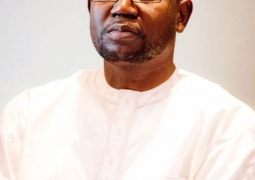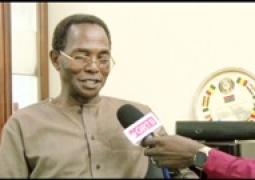Given the storm that has arisen in the wake of the December 4 presidential polls, many people have reached out to me asking how elections are conducted in the Gambia and if it could be manipulated or cheated. Of course, over the past few days, I have also heard so many outrageous stories being peddled that the election was stolen. Thus, as someone who has been involved in elections management in the Gambia over the past 15 years, this is what I tell those people.
First of all, the materials used for elections in the Gambia are the metallic ballot drums with a nozzle and a bicycle bell fitted inside the drum just below the nozzle, and translucent crystal balls or marbles. Probably this is the most primitive, direct and simplest election materials in the history of the modern world. Yet, by its crudeness it is also the safest, most secure and most difficult to manipulate or cheat.
In Gambian elections, the polling staffs includes staff from IEC and party agents. Every party or candidate in the election is required to provide an agent at every stage of the election. Together they all sit at the polling desk to receive voters. These agents are provided the voter roll so that together with the IEC staff, they also check if a voter’s name is on the list or not before the voter is handed a marble by the presiding officer. Hence no one can vote without a party agent not knowing and seeing the name of that voter in the voter list for that polling station. If he does not see it, he can raise objection and record and report to his or her party.
First of all, before voting starts, all polling staffs (both IEC and party agents) swear to an oath of due execution of office and secrecy, publicly. Then the presiding officer opens the ballot drums one by one so that all polling staffs look into it to confirm that they drum is actually empty. Then the drums are sealed with some kind of tough material which cannot be untied except broken or cut. Each seal has a serial number which polling staffs (including party agents) are required to record. This is the basic opening procedure before voting starts.
Before the ballot drums are placed in the voting booth, they are tied together by metallic binding wire by their handles such that one cannot move one drum alone but will need to move the entire set of drums together. And I can tell you that these drums are damn heavy. These opening of polls procedure also include the presiding officer counting the marbles she has received which are recorded by all the party agents present, as well as by observers and the journalists if they want to.
Next, at the polling station, there are domestic and international observers in addition to media. There are also voters who are already in the queue watching everything from a distance. The security officers on elections duties are also present and witnesses to every step of the procedure. Therefore, the setup is such that the election materials are secure and safe at all times and viewed by all.
When voting starts, the presiding officer sits closest to, but outside from where the ballot drums are placed so that she can hear the bell ring when a marble is dropped inside. If the presiding officer did not hear a bell ring after a voter gets in and comes out, she can ask the voter whether he voted or not. Furthermore, she can decide to go inside the booth to confirm but she has to be accompanied by the security officers and party agents. Sometimes some voters put a marble in their pocket and leave or just place it on top of the drum instead of dropping it inside. The presiding officer can intervene to either retrieve the marble or show the voter how to vote.
At the close of polls, the presiding officer asks the party agents and the security to go inside the voting booth to retrieve the drums which are still tied together. But first the nozzle through which marbles are dropped is sealed to prevent any more voting. Then the left-over marbles are counted and recorded as in the beginning. Remember at every stage of these procedures from the beginning to the counting of the vote, various forms are signed by the IEC officers and party agents to ensure confirmation.
After this, the drums are then taken out and placed in the middle of the polling station in full view of everyone before they are opened one by one. Once again, the polling staffs including party agents cross check the seals and their numbers to make sure that they are the same numbers they had recorded during the opening process. When everything is confirmed then the seals are broken with a plier or knife.
It is now that counting on the spot begins drum by drum on a counting tray which can carry either 100 or 200 marbles at a time when filled. The process continues this way until the end. It is also necessary to note that the polling station is not to be populated by everyone. Rather, there are accredited persons listed who can be present in the polling station, especially at these procedural stages to ensure non-interference. The security has the power to remove any unaccredited person. The observers and media can also report the presence of such persons.
At every stage of the counting process, the figure is recorded by all polling staffs and party agents on prescribed forms. The number of votes for each candidate are announced loudly for all to hear. When counting is done, then the Presiding Officer takes the result to the collation centre for verification by the Assistant Returning Officer. The results are escorted by security officers and party agents from the polling station. At the collation centre, there are also two party agents to observe the tabulation and upon satisfaction they sign the result form.
Next the Assistant Returning Officer sends the results in a sealed envelope to the IEC Regional Office who also verify. At the Regional Office, there are also two party agents who also observe the verification and upon satisfaction they sign the result form. Next the results are transmitted to the IEC headquarters where there are again party agents to verify the results and then sign the results form. It is after all these processes of verification in the presence of party agents, that the IE Chairman would now announce the results to the nation.
Therefore, the results that go to the Assistant Returning Officer and then to the Regional Office and then to the IEC headquarters is the same result that party agents already have and know. By that time, they would have already informed their party structures about the results. Remember, when in 2016 elections IEC announced the first results, by then Yaya Jammeh had already known that he had lost to Adama Barrow by 19 thousand votes which he himself said. Therefore, how can anyone cheat elections in this country? Even Yaya Jammeh could not cheat on election day and he never attempted because it is practically impossible.
The only way to cheat on election day in the Gambia will be to burn down the entire polling station, or destroy ballot drums, or prevent party agents, observers and the media from being present at the polling stations or bribe all of them not to record or make false claims. Who can do this?
Therefore, the claim that December 4 presidential elections are stolen is utterly false and outrageous.
Therefore, to those who are in doubt about the credibility of elections in the Gambia, rest assured that there is no cheating on election day in the Gambia, so far. Never. It is not possible. If it happens, no one will be in doubt.
For the Gambia Our Homeland



